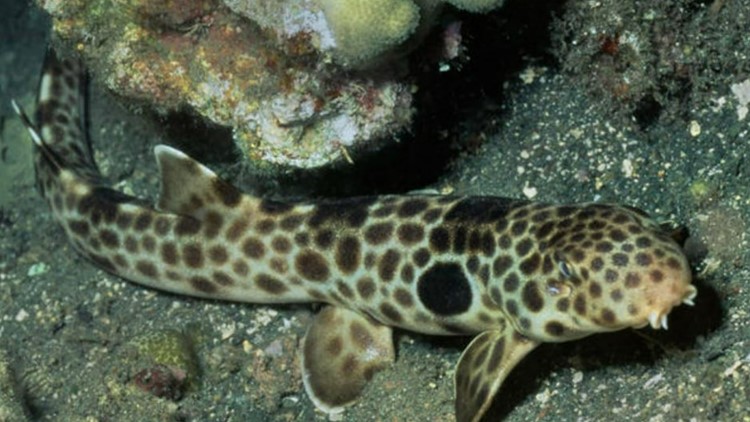BROOKFIELD, Ill. — A female shark gave birth to a pup at the Brookfield Zoo in Illinois this year – despite the baby having no father. The female epaulette shark was never housed with a male shark but produced a fertile egg without the need for a male, the zoo said in a news release.
The baby was born in August to the 3-year-old mother, even though epaulette sharks usually reach sexual maturity at age 7. The process of developing an embryo without a fertilized egg cell is called parthenogenesis.
Parthenogenesis, which means "virgin creation" in Greek, occurs mainly in some jawed vertebrates, but is unnatural for mammals, according to the National Institutes of Health. It may occur in whiptail lizards, komodo dragons, bonnethead sharks and other animals, according to Science.org.
According to the zoo, parthenogenesis is less common in sharks, which are complex vertebrates, meaning they have backbones.
Still, this phenomenon is not completely unheard of in epaulette sharks – this is believed to be just the second instance at a facility accredited by the Association of Zoos and Aquariums. Brookfield Zoo's female adult epaulette sharks originated at the New England Aquarium, where the first instance of parthenogenesis was recorded.
The mother, who arrived at the zoo in 2019, began laying eggs in 2022 but they were typically nonviable – until one came out fertile.
After incubating the egg for five months, the pup hatched. It is now five to six inches long and is expected to reach about three feet when it is fully grown.
"We are happy to report that our epaulette pup has been eating well on her diet of finely chopped capelin, minced squid tentacles, and other finely chopped seafood. Our colleagues at New England Aquarium have been a great resource as shark pups produced parthenogenetically can be very delicate," Mike Masellis, a lead animal care specialist at Brookfield Zoo, said in a statement. "We are looking forward to guests being able to see the pup."
Epaulette sharks are known for appearing to "walk" on the seafloor, the zoo says. The nocturnal fish are native to the waters between New Guinea and Australia and live in shallow areas near the sandy bottom.
They are called epaulette – meaning ornamental – because a pair of false eyes on the back of their heads look like decorations on a uniform, according to the zoo.



